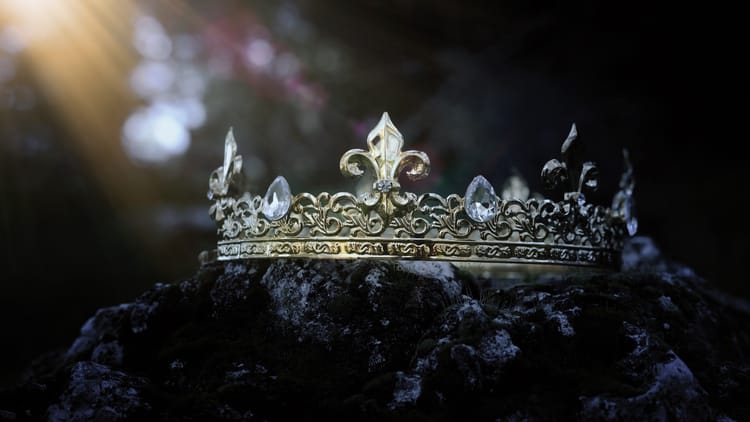The Provision of the Cross (Colossians 2:13-15)

I came across a news story last month that made my heart ache. A Calgary mother left her children in her SUV for a short time while she ran an errand. Through a series of tragic events, the younger of the two children ended up dying. The story breaks your heart, and I continue to pray for this mother.
A day after the story appeared, I was still thinking and praying for her when I came across another article. The article said that she would do anything to turn back time.
"I just want a do-over so bad," the grief-stricken mother said in an interview Thursday. "I made the wrong choice that day."
"I just want a do-over so bad." Can you relate to that?
Many of us here know what it's like to wish we could have a do-over. We'd like one day that we could do over, one decision we wish we could make once again. A do-over is exactly what many of us wish for, and for some of us the stakes are just as tragic and important as they were for this woman. It would make all the difference in the world.
The sad thing is that the Calgary mother can't get a do-over. When a tragedy hits, or you say something inappropriate, or you make a really bad decision, the consequences are often immediate and permanent. You wish you could have a do-over, but they're pretty rare. Most of the time we're stuck living with the consequences.
There's a reason for this. It's a theological reason, but it's as real as the seat you're sitting on, and it affects every minute of your life. We live in a broken world.
Most of you know this, but we sometimes forget that the Bible teaches that God made everything good. The world was in a state of peace or shalom – the word literally means peace, wholeness, well-being, not just the absence of conflict but a portrait of how God intended life to be. Think about that. Everything was exactly the way it was supposed to be. You and I have never experienced a single day like this. It was all good.
But then sin entered the world, and we've been living with the consequences ever since. Josiah's toe was injured a couple of weeks ago. It really hurt. He asked, "Why did this have to happen?" I didn't figure he wanted to hear, "Because Genesis 3 tells us that sin entered the world, and because of sin, death." Instead I just said, "That must really hurt."
But of course, that is the answer. We live in the post-tragedy, live with the consequences reality of things having gone terribly wrong.
Every injured toe, every broken heart, every broken marriage, every trip to the hospital – all of it can find its ultimate cause in the moment that sin entered the world. You and I have never experienced life the way that God meant it to be. We get glimpses of the world's goodness, but we haven't experienced a single day of life the way it meant to be lived.
Talk about needing a do-over!
Picture life at the end of Genesis 3. Adam and Eve have sinned and are now experiencing all the effects: relational breakdown, alienation from God, shame, the loss of a perfect world. They soon experience murder. Within generations they are experiencing drunkenness and revenge and ugliness. Within a short time, the Bible says:
The Lord saw how great the wickedness of the human race had become on the earth, and that every inclination of the thoughts of the human heart was only evil all the time. The Lord regretted that he had made human beings on the earth, and his heart was deeply troubled. (Genesis 6:5-6)
In other words, you have a world that's ready for a do-over.
What I want to do today is to skip from this point – a broken world – forward thousands of years to the death of a man in his thirties just outside the city of Jerusalem. His name was Jesus.
At first it looks like there couldn't possibly be any connection between the condition of the world and the death of this man. It's just another execution, another life gone off the rails or else just another tragedy. But according to the Bible, that's not the case at all. The death of this man is exactly what this world needed to be put right again.
The death of Jesus provides us with a do-over.
Do you get that? The death of Jesus provides us with a do-over.
Where do I get that from? We're going to look at three short verses that are found in Colossians 2:13-15. Let's read them together.
When you were dead in your sins and in the uncircumcision of your sinful nature, God made you alive with Christ. He forgave us all our sins, having canceled the charge of our legal indebtedness, which stood against us and condemned us; he has taken it away, nailing it to the cross. And having disarmed the powers and authorities, he made a public spectacle of them, triumphing over them by the cross.
Three realities from this passage. First, our lives and our worlds were in a mess. Second, the death of Jesus changes all of that and provides a do-over. Three, we can live in the light of this reality. We don't have to just live in a condition of brokenness. We can live in light of the one who has changed everything and is restoring it back to the way it was in the first place.
Okay, so first.
Our lives and our worlds were in a mess.
Anyone want to disagree with this?
Verse 13 says, "When you were dead in your sins and in the uncircumcision of your sinful nature." This is what we were like before we had a do-over. It's not a pretty picture, but it's where we started out.
There are days that everything seems right and pure and good. But most of us live in the reality that things aren't quite right in the world. We are living life outside the garden, and even the good moments make us realize how temporary they are, and how we long for more.
A friend of mine has just written a book. He writes:
He designed us as eikons (in God's image) with Garden cravings—longings for beauty, yearnings for wholeness, a magnetic pull to connect with the divine, and a deep connection to the dirt from which we were taken. Is it possible that every time you see this"—I gestured out the window—"you're quietly, but unmistakably reentering Garden moments?"
We know inwardly that we long for wholeness and peace, and that this isn't it. We're wrong, the world is wrong. Even the best moments aren't quite what they are supposed to be.
Paul says that we are living in after-garden life with broken lives. We're dead spiritually. We haven't experienced a day of the shalom that God created us for, but what's worse is that it's not just the world out there that is broken. We ourselves are broken. Something within us has gone desperately wrong, and we know it.
You and I are much less than we are made to be. We were made in God's image. We were made for peace, wholeness, and well-being. But we are cracked and broken. Who we are and what we experience is much less than what God created us for. Humanity is broken, and sin is making us less and less who we were meant to be. No argument here, we all know it.
Here's the second reality that Paul talks about.
Jesus changes all of that — the brokenness and the mess — and provides a do-over.
What does this mean? In what way does the death of this man have anything to do with the condition of this world and our longings for the way things should be? Well, read verses 13-15 with me:
When you were dead in your sins and in the uncircumcision of your sinful nature, God made you alive with Christ. He forgave us all our sins, having canceled the charge of our legal indebtedness, which stood against us and condemned us; he has taken it away, nailing it to the cross. And having disarmed the powers and authorities, he made a public spectacle of them, triumphing over them by the cross.
There's a lot there, so let's unpack it a little bit. Paul talks about two things that God did through the cross. We're really good at understanding one of them, and we're not so good at understanding the other.
The first thing that God did at the cross was to forgive us. Paul talks about us being forgiven, and he uses the ancient custom of canceling debts in that time – "having canceled the charge of our legal indebtedness, which stood against us and condemned us; he has taken it away, nailing it to the cross." The picture is of an IOU that's been wiped out, so that we no longer owe what we used to.
When I was at my previous church, they had an arrangement with pastors that I quite liked. They used to have a manse, but when they sold the manse they still wanted to be able to help their pastor with the cost of living in Toronto. So they gave the pastor an interest-free loan of $50,000 for as long as you stayed at the church. I still remember that before I ever worked a day there, they gave me this check for $50,000. I thought, "I love being a pastor!" But in order to get that money I had to sign an IOU saying that I would pay it back when I left.
Seven years later, I went to this church called Richview. There was this small matter of $50,000. The IOU had my name on it and I couldn't get around it. I would love if they had cancelled the notice of debt or ripped it up and put it through the shredder. But no such luck! I had to pay.
According to Paul, all of us had our names on an IOU. The IOU is the obligations we have not kept to God, listing what we owe. But there's not a chance that we can pay it.
Here's what God did at the cross. He canceled it. It's like he said, "This is void. It no longer applies." He's wiped it clean. Then, he took it away and nailed it to the cross. When Christ was nailed to the cross, Paul says, our debt has been completely forgiven.
God has forgiven us. What we owe has been pardoned. Every offense against God, every bit of our brokenness, every part of our mess and rebellion has been forgiven by God through the cross.
Now, I think you'd agree that if we stopped here it would be pretty good. In fact, this is usually where we stop when we talk about what Christ did at the cross. We say that your sins can be forgiven, and we stop there. That's good, but it's not enough.
Being pardoned is one thing, but what about the mess? We can be forgiven, but we still live in a broken world, and the mess isn't getting any better. It's great that we're forgiven, but what about all the mess?
We're really good at talking about forgiveness. It's what we often mention when we talk to others about when we share our faith. But there's more to what God accomplished at the cross, much more. Verse 15 says, "And having disarmed the powers and authorities, he made a public spectacle of them, triumphing over them by the cross." God didn't just forgive us at a cross. He defeated evil at the cross. God conquered Satan and conquered evil at the cross, which is one of the first steps to putting things right again.
Let me give you a picture of this. Jesus once talked about his battle against Satan. He said, "When a strong man, fully armed, guards his own house, his possessions are safe. But when someone stronger attacks and overpowers him, he takes away the armor in which the man trusted and divides up his plunder" (Luke 11:21-22).
At the cross, all the forces of evil came against Jesus and God, and for a moment it looked like they had won. But we know what really happened. The death of Jesus, which looked like a triumph of evil, was actually the victory of God over evil. The strong man, Satan, has been disarmed, and it's time for plunder. Jesus won a victory over evil through the cross.
That's why Paul wrote, "And having disarmed the powers and authorities, he made a public spectacle of them, triumphing over them by the cross."
In that day, when the Romans conquered somebody, they stripped the soldiers of their clothes and weapons and marched them through the street so that everyone could see that they were completely defeated.
Paul says that in the death of Christ, God has triumphed over evil powers, stripped them of their weapons and their clothes, and shown them to be powerless, dragging them in a triumphal procession so that everyone can see they're done. Satan has lost, God has won, and the world is being made right once again.
I know it doesn't always feel like this. It sometimes seems like Satan is as active as ever. John Stott writes:
This, then, is the situation. The devil has been defeated and dethroned. Far from this bringing his activities to an end, however, the rage he feels in the knowledge of his approaching doom leads him to redouble them. Victory over him has been won, but painful conflict with him continues.
But don't ever lose sight of these realities. First, our lives and our worlds were in a mess. Second, the death of Jesus changes all of that and provides a do-over. God could have left us at the end of Genesis 3 with a broken world and with everything gone wrong, but he didn't. He's made us right again, and he's apprehended and overpowered the evil one.
There's one more reality this morning.
We can live in the light of the reality of what God has done through Christ.
We don't have to just live in a condition of brokenness. We can live in light of the one who has changed everything and is restoring it back to the way it was in the first place. John Stott writes, "The victory of Christians consists of entering into the victory of God and enjoying its benefits." Our job isn't to win the victory. Our job is to enjoy and enter into the victory that Christ has already won.
What would it mean if we really believed this? What would it mean if we believed that God has forgiven us and conquered Satan and evil through the death of Christ? I mean, how would we really live if we believed these two realities?
Can I just give you something I've been thinking about? We talk so much about forgiveness and heaven. I think it's time to start reminding ourselves that salvation is about much more than forgiveness. It's about God restoring this world to what it should have been in the first place. It's about restoration, of things being made the way they were before sin ruined everything.
The point of the cross isn't forgiveness. Forgiveness leads to something much bigger: restoration. God isn't just interested in the covering over of our sins; God wants to make us into the people we were originally created to be. It's not just the removal of what is being held against us; it is God pulling us into the people he originally had in mind when he made us…
It is one thing to be forgiven; it is another thing to become more and more and more and more the person God made you to be.
Salvation is the entire universe being brought back into harmony with its maker.
Salvation, in other words, is getting a do-over.
Let's pray.
God, what an amazing salvation. Thank you for what you accomplished through Christ on the cross. Thank you for the provision of the cross.
They sang a new song, saying:
"You are worthy to take the scroll and to open its seals, because you were slain, and with your blood you purchased for God members of every tribe and language and people and nation. You have made them to be a kingdom and priests to serve our God, and they will reign on the earth."
Then I looked and heard the voice of many angels, numbering thousands upon thousands, and ten thousand times ten thousand. They encircled the throne and the living creatures and the elders. In a loud voice they were saying:
"Worthy is the Lamb, who was slain, to receive power and wealth and wisdom and strength and honor and glory and praise!"
Then I heard every creature in heaven and on earth and under the earth and on the sea, and all that is in them, saying:
"To him who sits on the throne and to the Lamb be praise and honor and glory and power, for ever and ever!" (Revelation 5:9-13)





